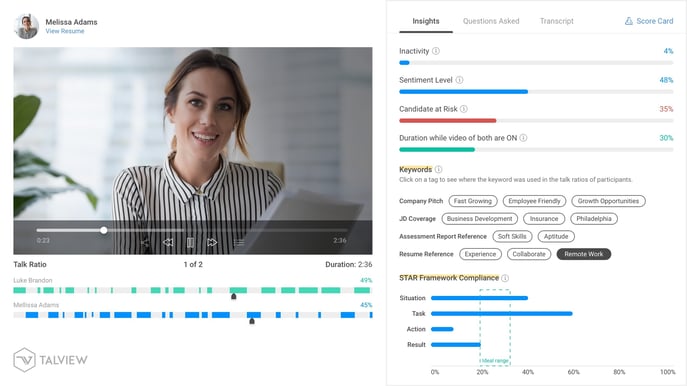Video interviews have become a popular choice for conducting interviews, especially after the COVID-19 pandemic. They provide employers with the ability to connect with candidates remotely, evaluate their qualifications, and make informed hiring decisions. However, it is essential to ensure that the video interviewing process is fair and unbiased.
A fair and unbiased interview process can help ensure that the best-qualified candidate is chosen for the job, and also prevent any legal issues from arising. In this post, we'll outline ten ways to ensure a fair and unbiased video interview process in more detail.
Identifying bias during the Interview process
Bias interviews can occur at any stage of the interview process, from the initial screening to the final decision-making. Some common instances where bias may creep in include:
- Screening resumes: Unconscious biases may lead recruiters or interviewers to favor or reject candidates based on factors like their name, educational background, or work history, rather than their qualifications.
- Pre-interview communication: Informal interactions preceding the interview, such as email exchanges or phone calls, can inadvertently influence the interviewer's perception of candidates, leading to biased assessments.
- Interview questions: Non-standardized interview questions may introduce inconsistency, allowing personal biases to sway evaluations.
- Non-verbal cues: During a live video interview, non-verbal cues such as facial expressions and body language can also contribute to bias.
- Group dynamics: In a panel interview, group dynamics can also contribute to bias. For example, if one interviewer is particularly vocal, their opinions may sway the opinions of other interviewers.
To prevent bias from creeping into the interview process, it is essential to have standardized evaluation criteria and to train interviewers on best practices for conducting interviews.
10 Effective Strategies for Ensuring Fairness in Video Interview process.
1. Define Job Requirements
- Clearly outline the qualifications, skills, and experience necessary for the role.
- Focus on objective criteria such as educational background, relevant work experience, and specific skills required for the position.
- Avoid subjective preferences or biases by aligning job requirements with the core responsibilities of the role.
2. Standardize Interview Questions
- Develop a set of standardized interview questions that assess candidates' competencies and suitability for the role.
- Ensure that all candidates are asked the same set of questions to maintain consistency and fairness.
3. Select Reliable Technology
- Choosing the right technology is essential for a successful interview. Select a reliable and secure video interviewing platform that is easy for candidates to use.
- Conduct a test run before the interview to ensure that the technology works well.
4.Asynchronous and Live Video Interview Format
- Asynchronous or on-demand video interviews allow candidates to record responses to pre-set questions at their convenience, promoting fairness and inclusivity.
- Live interview rooms provide real-time interactions between candidates and interviewers, emphasizing the importance of standardized evaluation criteria and unbiased communication.
5. Conduct Professional Interviews
- Set a professional tone for the interview by greeting candidates respectfully and creating a welcoming atmosphere.
- Clearly communicate the format and structure of the interview to candidates at the beginning.
- It is crucial to avoid personal biases and assumptions while evaluating the candidate.
6. Implement Standardized Evaluation
- Assessing candidates is a crucial step in the interview process. Use a standardized rubric to evaluate candidates, focusing on qualifications and experience over personal preferences.
- A standardized rubric can help to ensure consistency in the evaluation process. It is also essential to document and record the evaluation process to ensure consistency.
7. Foster Transparent Communication
- Communication is an essential aspect of the interview process. Provide timely and transparent feedback to candidates, informing them of the next steps in the hiring process.
- Thank candidates for their time and interest. Communication can help to ensure that candidates feel valued, even if they are not selected for the job.
8. Prioritize Diversity and Inclusion
Diversity and inclusion should be a priority in the interview process. It is essential to train interviewers to avoid unconscious bias and use inclusive language during the interview.
9. Pursue Continuous Improvement with interview insights.
- Regularly evaluate the effectiveness of the interview process and solicit feedback from candidates, interviewers, and other stakeholders.
- Utilize interview insights and performance metrics to identify trends and areas for improvement, driving continuous enhancement of fairness and effectiveness.
10. Uphold Ethical Standards
- Ethics are an important consideration in the interview process. Interviewers should avoid any behavior that could be considered unethical or immoral.
- This includes avoiding questions about personal matters, such as family status or political beliefs. Interviewers should also avoid making promises or commitments that they cannot keep.
Leveraging Technology for Fairness: Talview’s Video Interviewing Platform
Talview is an innovative video interview platform designed to simplify remote candidate interviews, offering both asynchronous and live video interview options. Whether conducting 1:1, panel, or group interviews, the platform automates the entire interview process, providing the following features:
- Standardized interview process by providing predefined questions & evaluation criteria.
- Real-Time Candidate Verification to prevent proxy hires.
- Integration with popular calendaring and conferencing tools
- Detailed Interview Insights & performance metrics for refined interview strategies
Conclusion
Conducting video interviews with integrity and fairness requires a systematic approach and a commitment to inclusivity. By implementing the ten steps outlined in this guide and leveraging technology to support fair interview practices, organizations can cultivate a culture of equity and excellence in their hiring processes.
Ready to revolutionize your hiring process with fairness and integrity? Contact us today to explore innovative solutions and create a more inclusive workplace for all.








Leave a Reply